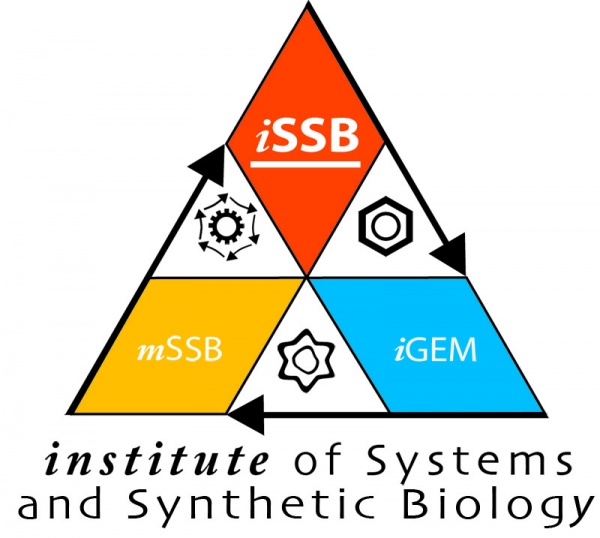Team:Evry/Model3
From 2013.igem.org
| Line 6: | Line 6: | ||
<h1>Siderophore production</h1> | <h1>Siderophore production</h1> | ||
| + | <p> | ||
| + | Enzymes regulation:<br/> | ||
| + | This regulation is based on two consecutives inhibitions, which, in the end, is an activator with a certain delay. The model will follow this principle.</p> | ||
| + | <p> | ||
| + | Variables:<br/> | ||
| + | <img src=””/><br/> | ||
| + | [Fe] : Iron concentration inside the bacteria | ||
| + | [Fur] : FUR concentration inside the bacteria | ||
| + | [FeFur] : Iron-FUR complex concentration inside the bacteria | ||
| + | LacI : Number of inhibited LacI | ||
| + | LacO : Number of non-inhibited LacO | ||
| + | [mRNA]: mRNA (from LacO) concentration | ||
| + | [Enz] : Enzyme concentration : EntA,-B,-C,-D,-E,-F | ||
| + | |||
| + | All those concentrations are expressed in mmol/L</p> | ||
| + | |||
| + | <p> | ||
| + | Parameters table: <br/> | ||
| + | <img src=""/></p> | ||
| + | |||
| + | <p> | ||
| + | Fe, FUR and FeFUR:<br/> | ||
| + | The iron-FUR complex is simply formed that way:<br/> | ||
| + | <img src=””/><br/> | ||
| + | 2Fur + 2Fe → Fur2Fer2 | ||
| + | We reduced this equation to:<br/> | ||
| + | <img src=””/><br/> | ||
| + | Fur + Fe → FeFur : Kfur | ||
| + | Which is not annoying, since we just have to divide our [FeFur] by to to get the real complex concentration.<br/> | ||
| + | We can easily write down both the formation (v) and the dissociation (v') speed:<br/> | ||
| + | <img src=””/><br/> | ||
| + | v = Kfur[Fur][Fe] | ||
| + | v' = dff[FeFur] | ||
| + | We chose to model the iron input in the bacteria using a linear function of the external iron concentration <i>Ferext</i>, the factor <i>p</i> being the cell-wall permeability for iron.<br/> | ||
| + | The FUR on the other hand, is produced by the bacteria. It's evolution can also be considered linerar, using a mean production rate <i>Fur0</i>.<br/> | ||
| + | <img src=””/><br/> | ||
| + | d[Fer]/dt = p*Ferext – Kfur[Fur][Fer] + dff [FeFur] | ||
| + | d[Fur]/dt = Pfur*Fur0 – Kfur[Fur][Fer] + dff[FeFur] | ||
| + | In this model, we only track the free Fe-FUR and not those which are attached to a FUR Binding Site. As <i>LacI</i> is the number of inhibited LacI, we can use this number to express how much Fe-FUR does bind to a FBS per unit of time.<br/> | ||
| + | <img src=””/> | ||
| + | d[FeFur]/dt = Kfur*[Fur][Fer] – dff*[FeFur] – 1/(Na*V)*dLacI/dt | ||
| + | </p> | ||
| + | |||
| + | |||
| + | |||
| + | |||
| + | |||
</div> | </div> | ||
Revision as of 18:21, 3 October 2013
Siderophore production
Enzymes regulation:
This regulation is based on two consecutives inhibitions, which, in the end, is an activator with a certain delay. The model will follow this principle.
Variables:
[Fe] : Iron concentration inside the bacteria
[Fur] : FUR concentration inside the bacteria
[FeFur] : Iron-FUR complex concentration inside the bacteria
LacI : Number of inhibited LacI
LacO : Number of non-inhibited LacO
[mRNA]: mRNA (from LacO) concentration
[Enz] : Enzyme concentration : EntA,-B,-C,-D,-E,-F
All those concentrations are expressed in mmol/L
Parameters table:
Fe, FUR and FeFUR:
The iron-FUR complex is simply formed that way:
2Fur + 2Fe → Fur2Fer2
We reduced this equation to:
Fur + Fe → FeFur : Kfur
Which is not annoying, since we just have to divide our [FeFur] by to to get the real complex concentration.
We can easily write down both the formation (v) and the dissociation (v') speed:
v = Kfur[Fur][Fe]
v' = dff[FeFur]
We chose to model the iron input in the bacteria using a linear function of the external iron concentration Ferext, the factor p being the cell-wall permeability for iron.
The FUR on the other hand, is produced by the bacteria. It's evolution can also be considered linerar, using a mean production rate Fur0.
d[Fer]/dt = p*Ferext – Kfur[Fur][Fer] + dff [FeFur]
d[Fur]/dt = Pfur*Fur0 – Kfur[Fur][Fer] + dff[FeFur]
In this model, we only track the free Fe-FUR and not those which are attached to a FUR Binding Site. As LacI is the number of inhibited LacI, we can use this number to express how much Fe-FUR does bind to a FBS per unit of time.
d[FeFur]/dt = Kfur*[Fur][Fer] – dff*[FeFur] – 1/(Na*V)*dLacI/dt
 "
"













